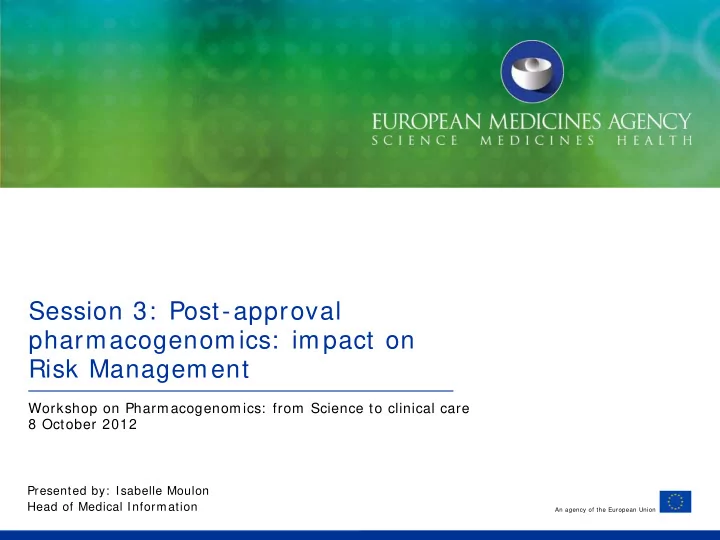

Session 3: Post-approval pharmacogenomics: impact on Risk Management Workshop on Pharmacogenomics: from Science to clinical care 8 October 2012 Presented by: Isabelle Moulon Head of Medical Information An agency of the European Union
Introduction Pharmacogenomics (PGx) is defined as the study of variations of DNA and RNA characteristics as related to drug response. • Pharmacogenomics (and pharmacogenetics* ) have the potential to improve the discovery, development and use of medicines. • Where possible, the SmPC should inform on important inter-individual variability in drug pharmacokinetics or response, and, on which extent, such variability can have a genetic basis. • Therefore, when relevant, genetic and genomic information should be mentioned in the SmPC. * Pharmacogenetics (PGt) is a subset of pharmacogenomics (PGx) and is defined as the study of variations in DNA sequence as related to drug response. 1
Overview of Pharmacogenomics information in SmPC 4.1 Therapeutic If the product’s indication depends on a particular genotype or the expression of a gene or a particular indications phenotype, this should be stated in the indication. 4.2 Posology and Where necessary, dosage adjustments in patients with a particular genotype should be stated (with cross- method of reference to other relevant sections for further detail as appropriate). administration 4.3 Contraindications Linked to a particular genotype 4.4 Special warnings and Subjects or patients with a specific genotype or phenotype might either not respond to the treatment or be precautions for use at risk of a pronounced pharmacodynamic effect or adverse reaction. These may arise because of non- functioning enzyme alleles, alternative metabolic pathways (governed by specific alleles), or transporter deficiencies. Such situations should be clearly described if known. 4.5 Interaction with If interactions with other medicinal products depend on polymorphisms of metabolising enzymes or certain other medicinal products genotypes, this should be stated. 4.8 Undesirable effects This section may include information on any clinically relevant differences specifically observed in patients with a specific genotype 4.9 Overdose If applicable, counteractive measures based on genetic factors should be described. 5.1 Pharmacodynamic Any relevant pharmacogenetic information from clinical studies may be mentioned here. This should properties include any data showing a difference in benefit or risk depending on a particular genotype or phenotype. 5.2 Pharmacokinetic Variations with respect to polymorphic metabolism should be described, if clinically relevant, in quantitative properties terms (with cross-reference to 4.2 when applicable). 2
Frequently Asked Questions 1. Should the SmPC include information on pharmacogenomic testing? 2. Should the SmPC inform on the frequency of a genotype or a phenotype? 3
Kalydeco Risk Management Plan (extract from EPAR) Kalydeco is indicated for the treatment of cystic fibrosis (CF) in patients age 6 years and older who have a G551D mutation in the CFTR gene Safety issue Agreed pharm acovigilance activities Off label use in children less than 6 years old of age Ongoing surveillance through routine and in patients with other mutations (non-G551D pharmacovigilance practices CFTR gating mutations and non-class III mutations) Long-term safety study: An Observational Study to Evaluate the Long-Term Safety of Ivacaftor in Patients With Cystic Fibrosis Study 110 Study 111 Study VX11-770-110: Phase 3 Study in subjects with cystic fibrosis who have the R117H-CFTR mutation Study 111: Phase 3 Study In subjects with cystic fibrosis who have a non-g551d CFTR gating mutation 4
5
EMA SmPC webpages • To promote compliance with SmPC guideline • EudraSmPC webpage – Training presentations Introduction to SmPC, guideline principles/ section Paediatrics, Older people, Pharmacogenomics – Useful links ( e.g. guidelines) – System of Query and Answer (regulatory network) • Public interface of the SmPC webpage on Agency’s website by the end of 2012. 6
7
Recommend
More recommend